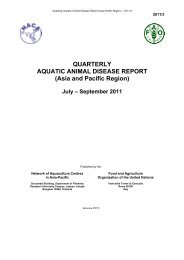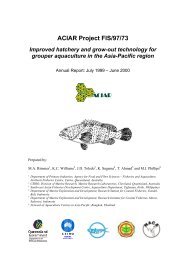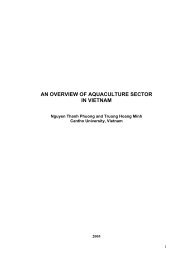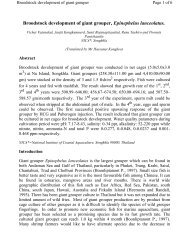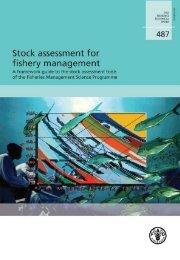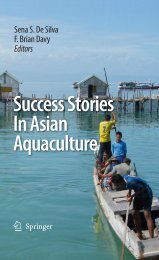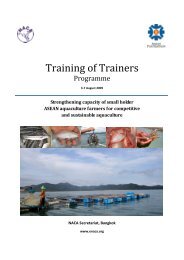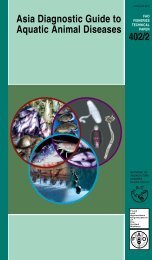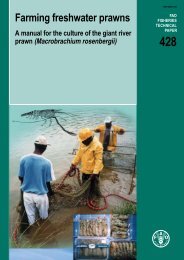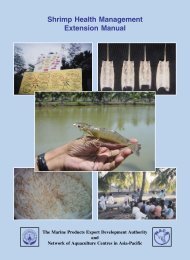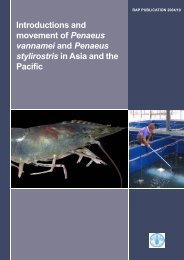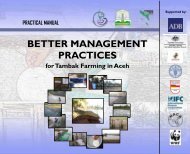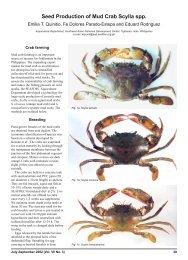• Requirements <strong>and</strong> guidance for feasibility studies, project planning <strong>and</strong> design, <strong>and</strong> projectenvironmental impact assessment.Government coastal aquaculture development strategies may be a useful step toward developing suchframeworks.In addition, government, banks, <strong>and</strong> international agencies should seek to facilitate a range of o<strong>the</strong>rinitiatives, perhaps including marketing <strong>and</strong> environmental labeling schemes; farmer organization <strong>and</strong>representation; research, pilot, <strong>and</strong> demonstration projects (design, technology, <strong>and</strong> management atfarm level; environmental management at district or provincial level); <strong>and</strong> more detailed codes ofdesign <strong>and</strong> practice appropriate to specific circumstances.The technical basis for most of <strong>the</strong>se interventions now exists <strong>and</strong> has been thoroughly reviewed in this<strong>and</strong> o<strong>the</strong>r recent publications. It is now up to national <strong>and</strong> local government, in close collaboration with<strong>the</strong> industry itself, to take <strong>the</strong> responsibility <strong>and</strong> initiative to facilitate <strong>the</strong> development <strong>and</strong>management of sustainable shrimp culture.The present study has revealed a number of issues that are not properly documented <strong>and</strong> about whichtoo little is known. In particular, very few studies have thoroughly assessed both <strong>the</strong> positive <strong>and</strong>negative social <strong>and</strong> environmental impacts of shrimp aquaculture.The Bank now has an opportunity to assist with, <strong>and</strong> contribute to, <strong>the</strong> ongoing processes of generatingreliable information <strong>and</strong> building consensus. In particular, <strong>the</strong>re is a need to organize a series of expertconsultations on key issues raised in this report. Recent meetings <strong>and</strong> consultations that have been heldare listed, along with <strong>the</strong> types of participants, in Annex 5.There is also a clear need for capacity building, especially in relation to aquaculture developmentplanning integrated with coastal management initiatives. These may in turn lead to a need for specifictechnical assistance <strong>and</strong> investment.Fur<strong>the</strong>r investigationAs a follow-up to <strong>the</strong> present report, it is proposed that field studies in different countries beundertaken in order to obtain primary data on issues where present knowledge is incomplete. (Studiesthat have been undertaken by <strong>the</strong> consortium, including proposed titles, are listed in Annex 4.) Areasfor research focus should include:• Sustainability;• Legislation <strong>and</strong> experience with existing regulations <strong>and</strong> procedures;• Regulatory <strong>and</strong> enforcement instruments;• Tax incentives;• Socioeconomic impacts of shrimp farming; <strong>and</strong>, specifically,• Employment effects.SustainabilityThe question of whe<strong>the</strong>r sustainable shrimp farming is possible, <strong>and</strong> under which conditions, has beenanswered in part through this study. However, a number of issues need to be identified, <strong>and</strong> measurestaken, in order to formulate a comprehensive policy for sustainable shrimp farming in a country. Thefollowing issues <strong>and</strong> measures, in particular, are important:• An appropriate institutional <strong>and</strong> legal framework for aquaculture needs to be established;• Integrated management of catchment <strong>and</strong> coastal areas in which aquaculture is contemplatedmust be taken into account;• Appropriate institutional mechanisms <strong>and</strong> human skills must be identified; <strong>and</strong>• The devolution of management to <strong>the</strong> lowest level of responsibility should be instituted (whilerecognizing <strong>the</strong> responsibility of government to provide <strong>the</strong> appropriate legal <strong>and</strong> institutionalframework), <strong>and</strong> <strong>the</strong> required technical support should be provided.73
The field studies are examining <strong>the</strong>se issues <strong>and</strong> experiences in countries included in this study in orderto better document <strong>the</strong> preliminary conclusions drawn in this report.<strong>Environment</strong>al capacity is often referred to in discussions of sustainability, but <strong>the</strong> concept has beenused very little in developing countries. There is a need to clarify <strong>the</strong> nature of environmental capacity<strong>and</strong> how it can be used to promote <strong>the</strong> sustainable development of aquaculture <strong>and</strong> o<strong>the</strong>r activities in<strong>the</strong> coastal zone.Social impact of shrimp farmingThe issue of <strong>the</strong> social impact of shrimp farming has been mentioned by many authors, <strong>and</strong> severalcases of social unrest have been reported. However, few, if any, attempts have been made to study <strong>the</strong>causes <strong>and</strong> <strong>the</strong> overall impacts of <strong>the</strong>se incidents, or of aquaculture’s social effects in general.Fur<strong>the</strong>rmore, very few studies have assessed comprehensively <strong>the</strong> overall social, environmental, <strong>and</strong>economic costs <strong>and</strong> benefits of aquaculture to particular areas or countries. Social impact is ano<strong>the</strong>rcomponent of <strong>the</strong> ongoing field studies.Legislation, regulations, <strong>and</strong> existing experienceLegislation related to shrimp farming has been introduced in some countries, but little is known about<strong>the</strong> implementation <strong>and</strong> effects of <strong>the</strong> associated rules <strong>and</strong> regulations. In o<strong>the</strong>r countries, specificlegislation has governed aquaculture development for many years. The field studies should focus onlegislation related to shrimp farming <strong>and</strong> should draw on experience with o<strong>the</strong>r types of aquaculture, incountries where such legislation has been in place for many years.Countries of specific interest in this regard include:• Thail<strong>and</strong> (as a major shrimp farming country with limited legislation);• Ecuador (as a major producer with very different scales <strong>and</strong> intensity of activities <strong>and</strong> l<strong>and</strong> usecontrols);• Sri Lanka (which has significant relevant legislation that has not always been effective);• China (which in some cases has strong central or provincial government control, <strong>and</strong> hasrecently embarked on ICM initiatives);• Vietnam (which has a rapidly exp<strong>and</strong>ing shrimp industry based mainly on very small-scaleproducers);• Indonesia (because of <strong>the</strong> scale <strong>and</strong> dispersion of <strong>the</strong> industry), <strong>and</strong>• Norway (as a salmon farming country with a long history of legislation related toaquaculture).In addition to legislation proper, <strong>the</strong> associated <strong>and</strong> accompanying regulatory instruments should beexamined in detail, <strong>and</strong> <strong>the</strong>ir effects should be identified. It would be practical <strong>and</strong> most effective tostudy regulations in <strong>the</strong> same countries where legislation is studied.Economic incentivesWhile economic incentives to promote <strong>the</strong> development of shrimp farming (or aquaculture in general)have been introduced in a number of countries, speculation about <strong>the</strong>ir effects is rampant. There isconsequently a need to establish reliable conclusions about <strong>the</strong> results of such incentives. Field studiesshould examine tax <strong>and</strong> o<strong>the</strong>r economic incentives introduced to promote aquaculture <strong>and</strong> particularly<strong>the</strong> results of <strong>the</strong>se incentives. However, tax incentives to promote sustainable aquaculture seem to beless common <strong>and</strong> less widely understood. Field studies are needed to identify various forms of taxincentives <strong>and</strong> constraints that are expected to promote sustainable aquaculture, <strong>and</strong>, to <strong>the</strong> extentpossible, <strong>the</strong> experiences <strong>and</strong> lessons learned from <strong>the</strong>ir use. It appears that countries of interest in thisregard would include Thail<strong>and</strong>, Malaysia, Indonesia, <strong>and</strong> Norway.Enforcement instrumentsThe present study has indicated that law enforcement instruments are ei<strong>the</strong>r lacking or not used asintended, for a number of reasons. Field studies need to examine cases of failure <strong>and</strong> success in thisregard <strong>and</strong> propose a general framework for establishing law enforcement instruments, particularly fordeveloping countries, while taking into account such illicit practices as corruption.74
- Page 7 and 8:
sensitivity analysis should include
- Page 9 and 10:
ABBREVIATIONSMTkgmcmhaozPUDFOBCIFC&
- Page 11 and 12:
ORGANIZATION OF THE REPORTIn Chapte
- Page 13 and 14:
same time, development is necessary
- Page 15 and 16:
Current shrimp farming practice inc
- Page 17 and 18:
Current status of the industryToday
- Page 19 and 20:
In recent years, several major crop
- Page 21:
CHAPTER 2: SHRIMP FARMING SYSTEMSSh
- Page 24 and 25:
FeedsHatcheries use a combination o
- Page 26 and 27:
FIGURE 8. CONTINUUM OF DIFFERENT SH
- Page 28 and 29:
TABLE 3. COMPARISON OF INPUTS FOR T
- Page 30 and 31:
Shrimp farming systems vary greatly
- Page 32 and 33:
creeks, and sea-grass beds, fulfill
- Page 34 and 35: arrangement in Thailand, for exampl
- Page 36 and 37: capacity is not exceeded, the nutri
- Page 38 and 39: shrimp or high-value finfish produc
- Page 40 and 41: In more immediately practical terms
- Page 42 and 43: Disease prevention and managementDi
- Page 44 and 45: (Raa 1996) indicates that it is pos
- Page 46 and 47: suitable for human consumption or f
- Page 48 and 49: • Supply and effluent canals shou
- Page 50 and 51: CHAPTER 4: SOCIAL AND ECONOMIC IMPA
- Page 52 and 53: opportunities would need to be iden
- Page 54 and 55: 26 workdays per hectare, and an ext
- Page 56 and 57: One of the key elements for success
- Page 58 and 59: Minimizing negative social repercus
- Page 60 and 61: CHAPTER 5: FINANCIAL RISKS ASSOCIAT
- Page 62 and 63: Credit riskAccess to credit at fair
- Page 64 and 65: Natural factorsShrimp diseaseThe ou
- Page 66 and 67: CHAPTER 6: PLANNING AND MANAGEMENT
- Page 68 and 69: Planning and resource managementIna
- Page 70 and 71: Such initiatives have been or are b
- Page 72 and 73: Conclusions and recommendationsReco
- Page 74 and 75: equired to promote sustainability a
- Page 76 and 77: CHAPTER 7: PROJECT PLANNING AND ASS
- Page 78 and 79: • Appraisal and supervision missi
- Page 80 and 81: The structure of the executive summ
- Page 82 and 83: CHAPTER 8: CONCLUSIONS, RECOMMENDAT
- Page 86 and 87: EmploymentAs mentioned in the repor
- Page 88 and 89: ANNEX 1: A BLUEPRINT FOR FEASIBILIT
- Page 90 and 91: • Sensitivity calculations and an
- Page 92 and 93: Table A4: World shrimp farming prod
- Page 94 and 95: ANNEX 4: CASE STUDIES UNDERTAKEN BY
- Page 96 and 97: ColombiaThe Adoption of Good Manage
- Page 98 and 99: LocationAppendix A--Meetings Held o
- Page 100 and 101: LocationAppendix A--Meetings Held o
- Page 102 and 103: LocationAppendix A--Meetings Held o
- Page 104 and 105: BIBLIOGRAPHYAdger, W.N. 1998. Susta
- Page 106 and 107: Claridge, G. 1996. Legal approaches
- Page 108 and 109: Hambrey, J.B., M. Phillips, K. Chow
- Page 110 and 111: Phillips, M.J., & D.J. Macintosh. 1
- Page 112: World Commission on Environment and



